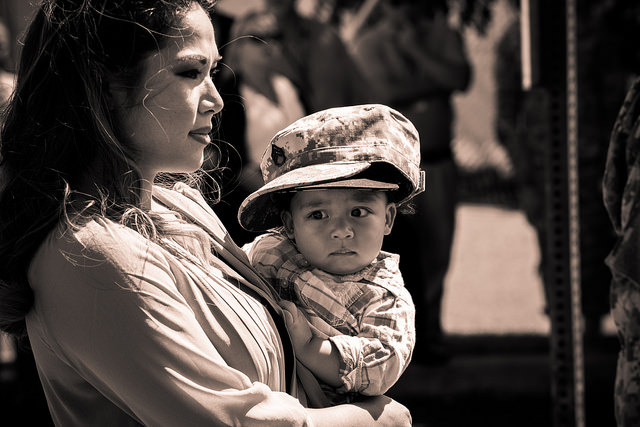There are close to 1.5 million people currently serving in the U.S. Armed Forces, with Texas boasting the second-highest military population in the country. Many join the military for the occupational training, job security, related benefits – it’s a big part of what keeps military service appealing in an increasingly competitive job market.
But what about job prospects for the spouses of service members?
Not very promising, according to a study commissioned by Blue Star Families, a non-profit that helps military families. The report shows that military spouses face high levels of unemployment and underemployment.
Kathy Roth-Douquet, the CEO of Blue Star Families, says that unemployment among military spouses is significantly higher than others in the same age range, and with similar education.
“Military spouses have an over 18 percent unemployment,” Roth-Douquet says. “(Compared to) 4.4 among their counterparts and 5 percent overall nationally. But that’s not all, we have over a 30 to 40 percent underemployment rate. That means a lawyer working as a secretary, or a health care administrator working as a receptionist, and that really hurts our families, too.”
One of the biggest reasons for this gap is because of how frequently military families have to move. Uprooting every few years means that military spouses aren’t able to stay in the locations where they are trained, and their new homes may not have the same job opportunities. But Roth-Douquet says that there are ways for them to maintain a job.
“In today’s economy, so many jobs are able to sustain remote work,” she says. “There’s a lot of technical jobs, and even more traditional jobs that can allow for people to work that way. So we feel that now more than ever before, this problem is really solvable.”
And it isn’t just a problem for the families involved, Roth-Douquet says – the loss of income affects the whole economy.
“(The study) shows that it cost the U.S. economy over $1 billion just in the out-of-pocket economic cost alone: lost wages, lost taxes, unemployment benefits,” Roth-Douquet says. “We know that the cost is even higher, because the number one reason people who are otherwise promotable choose to leave the military, is because of their household income. … So we lose the millions of dollars we spend training these folks. It hurts the families, it hurts the military, and now we know it hurts the country too.”
Roth-Douquet says that the problem has become more urgent in our modern economy because families are different than they were in previous generations, like in the 1970s, when the all-volunteer force was new. Now, she says we need to take steps to reduce the problem.
“We need a public-private partnership to first of all, make this situation visible,” she says. “Ask corporations to join with us to make a conscious attempt to hire, retain, and promote military spouses. There’s lots of terrific programs, but if we work together in a public-private partnership, we can really make a difference.”
Prepared for web by Alexandra Hart.















